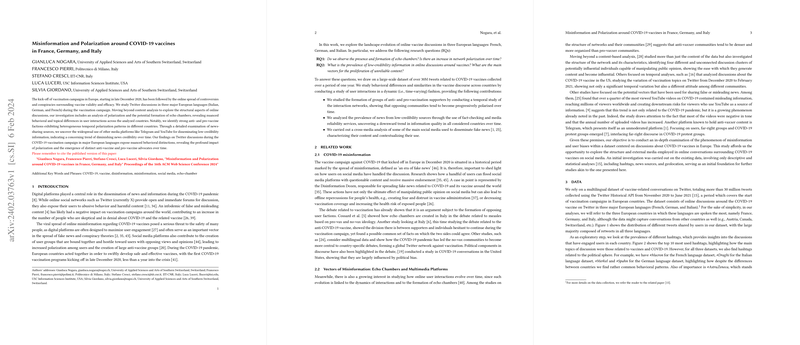Analyzing Misinformation and Polarization in COVID-19 Vaccine Discussions: A Study of Twitter Data
The paper titled "Misinformation and Polarization around COVID-19 vaccines in France, Germany, and Italy" provides an in-depth analysis of Twitter conversations pertaining to COVID-19 vaccines, focusing on the presence of misinformation and polarization in discussions. The research uniquely explores the structural aspects of online discourse across three major European languages: French, German, and Italian, and investigates the role of social media platforms in disseminating both credible and untrustworthy information.
The research addresses two primary questions: the formation of echo chambers and an increase in network polarization over time, and the prevalence and vectors of low-credibility information within vaccine-related discussions. It utilizes a robust dataset of over 30 million tweets collected via Twitter's Historical API, covering a pivotal period from November 2020 to June 2021—coinciding with the early rollout of COVID-19 vaccination campaigns in Europe.
Methodological Approach
The paper adopts a distant-supervision approach to assess the credibility of shared news outlets using NewsGuard ratings. This approach enables a systematic evaluation of low-credibility and high-credibility domains by examining the rating distributions of shared URLs. Furthermore, the analysis is enhanced by constructing temporal retweet networks to identify patterns in user interactions, revealing how these evolve into polarized communities or echo chambers over time.
To categorize the interactions, the researchers apply the Louvain community detection algorithm to retweet networks created at three distinct times, each snapshot aligned with significant vaccination-related events. This temporal division allows the paper to capture dynamic changes in user behavior and the structure of discussions as vaccination campaigns progressed.
Key Findings
The paper's results underscore a nuanced evolution of online vaccine debates across different languages and regions:
- Echo Chambers and Polarization: The analysis demonstrates the formation of polarized communities, particularly evident in the French and Italian datasets from early stages, reflecting ideological and political alignments. In contrast, the German dataset exhibited a delayed yet eventual polarization, highlighting a more homogeneous discourse that evolved only towards the later stages.
- Credibility of Shared Sources: Despite a higher prevalence of reputable sources, low-credibility news was notably disseminated, especially within anti-vaxxer communities. The trend of diminishing credibility over time was observed, with substantial emphasis placed on examining external media platforms like YouTube and Telegram. Analysis indicated a significant portion of anti-vaxxer content originating from these platforms, aligning with existing concerns about their role in spreading misinformation.
- Impact of External Platforms: Links to YouTube and Telegram were prevalent and examined for their association with misinformation dissemination. The paper found that videos flagged as COVID-related or unavailable likely contributed to the spread of misinformation, especially in the French and Italian datasets.
Implications and Future Research Directions
The findings have practical implications for understanding how information and misinformation about vaccines propagate through social networks, impacting public health efforts and shaping public opinion during a global crisis. The paper emphasizes the necessity for robust misinformation identification strategies within social media platforms to mitigate the risks associated with polarized discourse and unverified sources.
Future research might expand on this work by incorporating more languages and regional datasets, enabling a broader cross-cultural analysis. Additionally, examining more recent data could provide insights into the evolution of vaccine discourse post-2021 and the long-term effects of initial misinformation waves on public perception and policy.
Concluding Remarks
This research contributes to the growing body of literature on social media's impact on public health narratives by highlighting the intricate patterns of misinformation and polarization within online vaccine discussions. It underscores the critical role played by digital platforms in shaping these conversations and the ongoing challenges in ensuring the reliability and integrity of shared information. As digital communication continues to expand its influence globally, understanding these dynamics is paramount for effective public engagement and policy-making.
